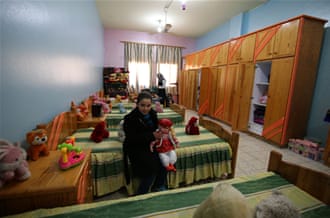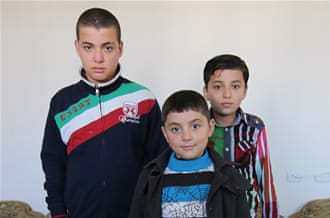bring up children under the blessing of Allah, it is necessary that from
their early age we should introduce them to the ways of invoking our Lord,
the Magnificent, the Beneficent. May Allah fulfill our wishes and make our
efforts successful in this regard. Amin!
What to Say
|
When to Say It
|
What it Means
|
| Bismillah. | When I start to do anything. | In the name of Allah. |
| La ilaha ill-Allah, Muhammad-ur-Rasul Allah. | The greatest words for me to recite are... | None has the right to be worshipped except Allah and Muhammad is the Messenger of Allah (pbuh). |
| Sall-allahu'alaihi wa sallam. | When the name of our Prophet Muhammed is mentioned to us. | May Peace and Blessings of Allah be upon him. |
| Bismillahi tawakkaltu alAllah wa la haula wa quwwata illa billah. | When I go out from my home. | In the name of Allah, there is no strength nor power except with Allah. |
| In sha Allah. | If I plan anything in the future. | If Allah wills, I will do so. |
| Raditu billahi Rabban wa bil-Islami dina wa bi Muhammadin sall-Allahu alaihi wa sallam Nabiya. | In the morning and evening. | I am pleased with Allah as the Lord and Islam as the religion and Muhammed (pbuh) as the prophet. |
| Bismillahi was-salatu was salamu ala Rasulil Allah allahummaftah li abwaba rahmatika. | When I enter the mosque. | In the Name of Allah and (pbuh), O Allah! Open for me the gates of your (rahmatika) mercy. |
| Bismillahi was-salm ala Rasulil Allah Allahuma inni as'aluka min fadlika. | When I step out of the mosque. | In the Name of Allah and (pbuh), O Allah I ask You from Your Favors. |
| Audhu billahi minash-Shaitan-ir-rajim. | At the time of anger. | I seek refuge with Allah from the Satan, the cursed one. |
| Jazak Allahu khairan. | When anyone favors me with good. | May Allah give you a better reward. |
| Allahumma at'im man at'amani wasqi man saqani. | When I am a guest and dine at the table of another person. | O Allah! Feed him who fed me and give him drink who gave me drink. |
| Dhahabaz-zama'u wabtal-latil 'urooqu wa thababatal ajru insha' Allah. | When I break my fast in Ramadan. | Thirst has vanished and veins are moistened and the reward is established, if Allah wills. |
| Bismika Allahumma amutu wa ahya. | When I intend to sleep. | With your Name, O Allah I die and live. |
| Allahumma inni a'udhu bika minal khubuthi wal khabai'th. | When I enter the toilet. | O Allah, I seek refuge with you from the bad evil Jinns. |
| Hasbun-Allahu wa Ni'm-al-Wakil. | When I face any enemy. | Allah is sufficient for us and He is the best disposer of affairs (for us). |
| As-salamo alaikum dara qaumin-mo mineen wa inna in sha Allahu bikum lahiqun. | When I visit a Muslim graveyard. | Peace be upon you, the dwellers among the believing people; and if Allah wills we are also to join you. |
| La ba'sa tahurun insha' Allah. | When I visit a sick person. | Never mind, it is a purifier if Allah wills. |
| Innalillahi wainna ilaihi raji'un Allahumma ajirni fi musibati wa akhlif li khairran minha. | When any affliction occurs to me. | Truly! To Allah we belong and truly to Him we shall return. O Allah! Compensate me for my hardship and provide me a substitute of it. |




